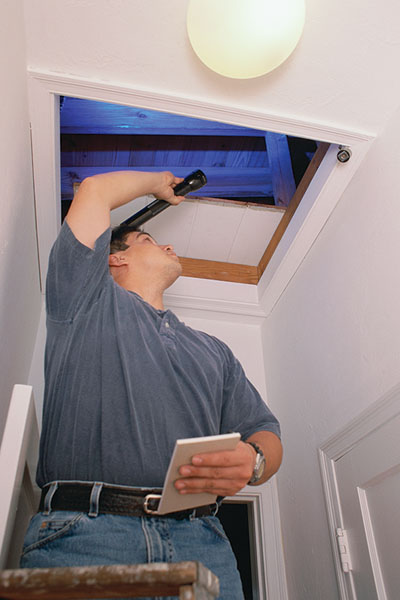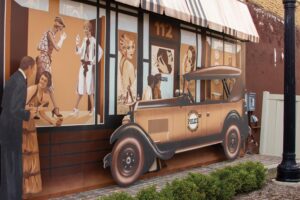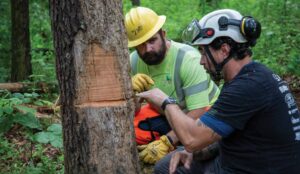Ronald Reagan once remarked, “To sit back hoping that someday, some way, someone will make things right is to go on feeding the crocodile, hoping he will eat you last – but eat you he will.”
There are many memorable quotes associated with business, or the economy, or the recession. And, even though at first glance the quote above does not appear to be related to economic affairs at all, it pointedly speaks to how rural Illinois entrepreneurs have built their businesses to survive, and even prosper, despite the current state of our economy. It is the self-sufficient attitudes and practices of rural business leaders, universally providing a base for the local economy, which enables downstate Illinois to compete in the emerging world market.
But, it hasn’t been easy.
All you have to do is turn on the television, or pick up a paper and you’re sure to see how bad things are. Unemployment is up. Job creation is down. But somehow, through it all, these businesses keep chugging along.
So maybe things aren’t quite what they seem. Just take a look at the hard numbers. According to the Illinois Department of Employment Security (IDES), the unemployment rate in 2009 averaged 10 percent. In 2010 and 2011 that number remained close to the same at 9.7 percent. Last year the annual average for Illinois unemployment was down to 8.6 percent. Don’t misunderstand. That’s still a lot of people out of work, but the trend toward a lower percent of unemployment shows hope for our economy to rebound.
Illinois entrepreneurs have played a large part in the recovery. Did you know Illinois is home to more than 1 million small businesses? While quite a few of these are smaller, one-man shops, more than 255,000 of them employ Illinois citizens, providing much-needed jobs to their communities. Small businesses are so fundamental to our economy that they account for almost 50 percent of private sector jobs in the state. It is for that reason Illinois should celebrate its entrepreneurs.
There are a multitude of examples of the entrepreneurial spirit alive and well in rural Illinois, but in order to provide a picture of how these businesses have developed, and what they are doing to survive and grow during these trying times, we will feature three disparate businesses and the people running them.
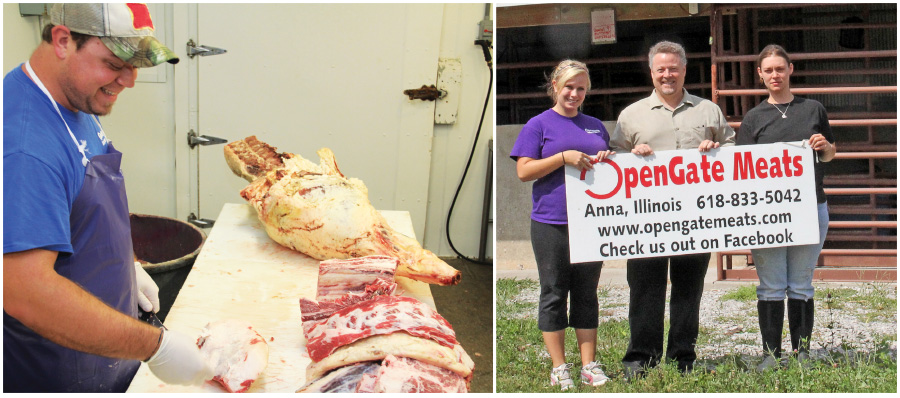
Meat Processing
Butchering is not what it once was. Processors may be worried about undercover exposure and government regulatory issues, as well as being sued or charged with animal cruelty. But the fact of the matter is, people eat meat. And the folks at Opengate Custom Meats in Anna have really stepped up to serve the local community.
Opengate has been in operation for nearly 35 years, but in January of 2009 a partnership of Brad Housewright, Ron Duncan and Lisa Yates purchased the plant and renewed operations. 2009 wasn’t exactly a banner year for business, so it definitely wasn’t the most obvious time to be entering into a new venture.
When questioned about the reason for opening during such a hard time, Housewright explains, “We survived because there is a big push for local product. People are wanting to know more about the origin of where their meat comes from. People just want to know that they’re getting local product so they know it’s safe.”
It’s that locally-grown and-operated attitude that has served so many other businesses well in rural Illinois. Opengate provides an essential service to local producers.
Manager Lisa Yates continues, “We’re sustainable living at its best. People always have to eat. That’s one of the main reasons we have stayed open. There are so many cattle and hog producers in the area that need to have a place to take their meat. We have a lot of local producers that work with us. They use the meat to feed their family, and some sell at farmer’s markets and grocery stores.”
Housewright agrees, “From the standpoint that we have built a customer base of local producers, we are able to do all types of custom processing for them in a local food economy. They call us all the time saying we have two beef that need processed. It’s building a local food market utilizing local producers for beef, pork, whatever. That’s basically what we’re doing.”
Opengate also provides much needed jobs for downstate Illinois. Although the partners admit that they’ve had some turnover, they do employ 4 full-time and 2 part-time people. It’s one of those jobs that’s hard to fill.
Housewright says, “To be honest with you, it is a dying art because most of the stuff that large retail chains get in, is already cut up in primal cuts and then they just cut it down and package wrap most of it. They don’t go through the full meat process. There are only a handful of plants in southern Illinois.”
“It’s one of those jobs that once you get trained and comfortable, you stay,” says Yates. “For the people that stay on, this becomes a permanent home for them.”
Don’t get the idea they service only those looking to have meat processed. Opengate also sells meat to the local community.
“Although we are a full-service processor providing white label for producers and custom processing for producers including beef, hogs, lamb and goats, we also have a full selection of retail meats,” remarks Yates.
That commitment to their community shows in Opengate’s local involvement as well. It supports the WIBH Blue Ribbons for Kids Campaign, the Girl Scouts of America, Bonan-Fowler Clothes for Kids Campaign and makes many other charitable donations every year to local food pantries and fundraising causes to help people in need.
Because their business is founded upon involvement in the local economy, Opengate spends a significant amount of effort ensuring that local groups have what they need.
If you want to find out more information about Opengate Custom Meats, you can call Lisa at 618-833-5042 or find them on Facebook.
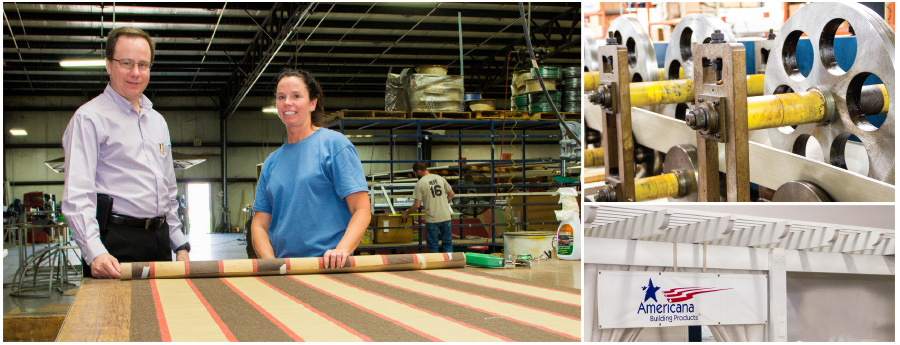
Manufacturing
Any talk about economic recovery in Illinois must include manufacturing. According to the Bureau of Labor Statistics, Illinois manufacturers employ nearly 600,000 people. And since 2010, Illinois manufacturers have added more than 40,000 new employees. The sad fact about that statistic is most manufacturers would love to hire more, but many of them can’t find qualified personnel. It’s not all about assembly line anymore. Now, you need to possess math skills, the ability to pass a drug test, and in some cases, computer skills.
Tri-County Electric Cooperative members, the Purcell family are a shining example of a rural Illinois manufacturer doing things right.
Americana Building Products started out as Hindman Manufacturing Co. in 1947, and was located in Central City. The Purcell family purchased the company in 1985 to keep it from being sold and moved out of the area. In the years since, the family has carefully expanded the company through building new facilities, as well as modernization of equipment and acquisitions.
Prior to 1985, the majority of the company’s sales were directly tied to products used by the manufactured housing industry. But with the rise of large home improvement chains, the family has developed great working relationships with companies such as Lowe’s and Menards.
By 1996 the company had grown so much it needed to expand manufacturing and office space. Says Jeff Purcell, “We were originally from Salem, so we came back. There is a large steel supplier located in Salem, also, and that didn’t hurt.”
The company purchased 10 acres in the Salem Industrial Park and built a 120,000 square foot plant, which included 12,000 square feet of office space. And still, this family wasn’t done building their business.
“We created a new start-up in 1997 called Americana Powder Finishing. It’s a state-of-the-art metal powder coating operation to paint aluminum and steel. Americana Powder Finishing is now the largest powder coater in southern Illinois. We coat for many local companies such as Jarco Inc., a manufacturer of propane delivery and transport trucks, and New Metal Fabrication. We also service large companies like Allied Tube & Conduit in Chicago and Grain Systems Inc. with plants in Assumption, Paris, Newton and Flora,” says Purcell.
The plant expanded another 36,000 square feet in 2006 and last year, Lowe’s approached the company about providing a modular wheel chair ramp system to be branded with their Gatehouse store brand.
“With our in-house engineering and CAD expertise, we were able to beat out a Chinese manufacturer and another US firm with our design. This new system is being stocked in more than 300 Lowe’s stores today, with expansion into more stores later this year,” says Purcell.
Currently Americana Building Products employs 85 people. When asked about the outlook for their business, Purcell replies, “In the fall of 2007 the housing market and park development declined, so we began planning because we saw it coming. But, now we’re starting to see it pass. Things are mostly level, with a little uptick last year. It’s a slow climb out in the building products. But, in powder coating, we are seeing tremendous gains with the Ag industry and propane tanks.”
If you’re interested in finding out more about Americana Building Products, you can visit them online at http://www.americana.com/ or call 1-888-442-2928.
In the meantime, Jeff has this advice for anyone operating a family owned business, “Customer service is key number 1. A real person should answer the phone when you call. If there’s a problem, then top to bottom, we have told our managers they have the authority to handle the situation at their level. Good customer service takes care of sales. Oh, and when working with family, work to get along. That’s what’s important.”

Tourism
Did you know that during 2012 visitors to Illinois spent more than $30 billion on tourism-related activities? In fact, most years Illinois has nearly 100 million visitors exploring all the areas and events geared toward attracting tourism dollars. But, we can’t rest on our laurels and just expect people to continue to come and spend their hard earned money here in our state. Other states have already launched aggressive ad campaigns to tempt travelers to visit. For the most part, every dollar spent on tourism campaigns brings a nine dollar return.
So, if you’re looking for something to do in Illinois head on over to www.enjoyillinois.com and you’re sure to find something that suits you. But if you want a real treat of something completely out of the ordinary, try out The Smokin’ Gun Hunting Lodge located in Hamilton, Ill. (www.smkgun.com).
The Smokin’ Gun Hunting Lodge has a large main building that holds 21 beds in an assortment of room styles. There’s a large open area for seating on the lower level, and of course tons of outdoor space.
In addition to traditional hunting, visitors can join a skeet shooting league or just shoot for the day. Aron Metternich, a resident of Hamilton, speaks highly of the lodge, “Having shot competitively for nearly 30 years, I have been to dozens of shooting clubs across the country. Smokin’ Gun is one of the best kept clubs I have been to, so much so that it has a golf course like feel to it. And, the best thing is that I only have a 5 minute drive to get there.”
It’s not only local residents that enjoy the lodge.
Lance Buckert of Chicago says, “The Smokin’ Gun has become a destination point for me and several members of my family. My brother and I, as well as several of our cousins, get together every 4th of July to shoot sporting clays before our family barbeque. The facilities are in great shape and the management has always been very accommodating.”
The Smokin’ Gun doesn’t employ much full-time help, but it certainly does bring dollars to the area. And, according to Western Illinois Electric Cooperative member and Smokin’ Gun manager Terry Phillips, “At any one time we can employ up to five part-time employees. We have help with the dogs sometimes. We hire hunting guides, and we have help running the leagues.”
The Smokin’ Gun Hunting Lodge is located at 995 E County Road 1550 in Hamilton. Your GPS should get you there, but just in case, ask any local and they’ll be able to direct you to the place.
All three of the business featured here are examples of the hope Illinoisans have for economic recovery. Whether it be tourism, manufacturing, food processing or another industry, those visionary entrepreneurs who are brave enough to keep their doors open during this recession embody the American spirit—that willingness to starve the crocodile and face it head on, assured that even if we falter, things are bound to get better. In fact, they already are.

